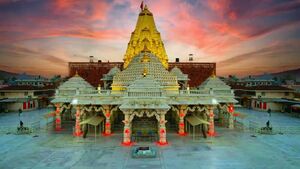Ambaji Tourism and Travel Guide: Explore the Spiritual Heart of Gujarat
Body
Ambaji, a small yet spiritually significant town located in the Banaskantha district of Gujarat, is a revered pilgrimage site for millions of Hindus. The town is best known for its iconic Ambaji Temple, one of the 51 Shakti Peethas dedicated to the goddess Amba, making it a key destination for spiritual seekers and tourists alike. Whether you are drawn to its religious importance or its natural beauty, Ambaji tourism offers a serene escape steeped in myth, tradition, and culture.
Why Visit Ambaji?
The allure of Ambaji lies in its blend of spirituality and scenic beauty. As a major center for goddess worship in Hinduism, the town is frequented by devotees who come seeking blessings at the Ambaji Temple. But beyond its religious appeal, Ambaji is nestled amidst lush hills and offers breathtaking views, peaceful landscapes, and historical significance, making it a well-rounded travel destination for both pilgrims and nature lovers.
Importance of Ambaji in Hinduism
Ambaji holds a special place in Hinduism, being one of the most important Shakti Peethas. According to ancient texts, it is believed that the heart of Goddess Sati fell here when Lord Shiva carried her dismembered body across the universe. This site is considered sacred and has drawn devotees for centuries, ensuring Ambaji's status as a significant spiritual hub.
History of Ambaji Temple
The history of the Ambaji Temple is steeped in devotion and legend. Dating back to the Vedic period, the temple has long been a focal point of worship. The exact origins of the temple are unclear, but it is believed to be one of the oldest Shakti Peethas, attracting devotees from all corners of India.
Ancient Roots and Significance
The temple's architectural grandeur and spiritual significance reflect its long-standing history. The temple complex has been renovated and expanded over time, yet it still retains its ancient essence, making it a timeless destination for those seeking spiritual solace.
Ambaji Temple Overview
Ambaji Temple is known for its striking architecture, spiritual energy, and the absence of an idol inside the sanctum. Instead, the deity is represented by a Yantra, a geometric symbol considered the embodiment of the goddess Amba. The temple's unique features set it apart from other temples and add to its mystical allure.
Main Features of the Temple
The temple complex is vast and includes several smaller shrines, a large prayer hall, and a beautifully maintained garden. The architecture blends traditional Hindu temple design with intricate carvings and detailing. Devotees offer prayers and perform rituals, and the temple is often filled with the sound of devotional chants.
What to Expect When You Visit
When you visit Ambaji Temple, be prepared for a spiritually charged atmosphere. The temple is often crowded with devotees, especially during festivals like Navratri, but the experience is deeply rewarding. The calmness of the temple grounds, coupled with the vibrant energy of the pilgrims, creates an unforgettable experience.
The Legend Behind Ambaji Temple
One of the most captivating aspects of Ambaji Temple is the legend associated with it. According to Hindu mythology, Goddess Sati’s heart fell at this site when her body was cut into pieces by Lord Vishnu’s Sudarshan Chakra. This event marked Ambaji as a sacred place, where devotees come to worship the divine feminine power.
How to Reach Ambaji
Ambaji is well-connected by road, rail, and air, making it accessible from various parts of the country.
By Road
Ambaji is around 180 km from Ahmedabad, and regular buses and taxis are available. The journey is comfortable, with scenic views along the way.
By Rail
The nearest railway station is Abu Road, located about 20 km from Ambaji. From here, you can take a taxi or a bus to reach the temple.
By Air
The nearest airport is Sardar Vallabhbhai Patel International Airport in Ahmedabad, around 180 km away. From the airport, taxis and buses can take you to Ambaji.
Best Time to Visit Ambaji
The best time to visit Ambaji is during the cooler months, from September to February. This period offers pleasant weather, making it ideal for sightseeing and temple visits.
Seasonal Guide
Avoid visiting during the summer months (March to June), as temperatures can soar, making travel uncomfortable. The monsoon season (July to August) brings refreshing rain, but the weather can be unpredictable.
Key Festivals and Events
Navratri is the most celebrated festival in Ambaji, drawing thousands of pilgrims. During this time, the town comes alive with vibrant decorations, dance, and religious festivities.
Ambaji Temple Timings and Entry Information
Ambaji Temple is open from 7:30 AM to 11:30 AM and 12:30 PM to 4:30 PM. Entry is free, but donations are welcome. It’s advisable to visit during non-peak hours to avoid large crowds.
Ambaji Tour Packages
Several tour operators offer packages tailored to your needs. You can choose from pilgrimage tours, weekend getaways, and family-friendly tours that cover nearby attractions like Mount Abu.
Pilgrimage-Focused Tours
Pilgrimage tours typically include a visit to Ambaji Temple, Gabbar Hill, and Koteshwar Mahadev Temple, ensuring a spiritually fulfilling experience.
Family-Friendly Tours
For families, tours often combine religious visits with leisure activities, including trips to nearby hill stations and nature spots.
Places to Visit Around Ambaji
Ambaji is surrounded by several other attractions worth exploring.
Gabbar Hill
Located just 4 km from the temple, Gabbar Hill is believed to be the original seat of the goddess. A cable car ride takes you to the top, offering panoramic views.
Koteshwar Mahadev Temple
This ancient Shiva temple is located near Ambaji and is a peaceful spot for meditation and prayer.
Kailash Hill Sunset Point
For those looking for a picturesque experience, Kailash Hill offers a beautiful sunset view, making it a perfect spot for relaxation.
Ambaji Accommodation Options
There are a variety of accommodation options in Ambaji, ranging from budget hotels to guest houses and dharamshalas.
Hotels
For a more comfortable stay, several mid-range and luxury hotels are available with modern amenities.
Dharamshalas and Guest Houses
If you prefer a more spiritual experience, many dharamshalas and guest houses offer simple, clean accommodation at affordable rates.
Local Cuisine in Ambaji
Ambaji’s cuisine is a reflection of Gujarat’s rich food culture. Don’t miss trying the local thali, which includes dishes like dhokla, khandvi, and the famous Gujarati kadhi.
Must-Try Dishes
In addition to the thali, you can enjoy local sweets like jalebi and shrikhand. Be sure to visit the street stalls for some authentic flavors.
Popular Eateries
For a hearty meal, visit some of the popular eateries in the town, such as Bhagyashree Restaurant or the Ambaji Annapurna Bhojanalaya.
Tips for First-Time Visitors to Ambaji
Visiting Ambaji for the first time? Here are some tips to enhance your experience.
Dress Code for Visiting Temples
Modest clothing is recommended when visiting the temple. It’s best to avoid sleeveless tops or shorts.
Etiquette and Customs
Maintain silence inside the temple premises and be respectful of the rituals being performed.
Shopping in Ambaji
Ambaji is a great place to pick up spiritual souvenirs, including religious books, idols, and prayer items.
What to Buy: Souvenirs and Spiritual Items
You can buy traditional items such as kumkum, religious texts, and figurines of Goddess Amba, which make for meaningful keepsakes.
FAQs About Ambaji Travel
1. What is the best time to visit Ambaji?
The best time to visit is from September to February, when the weather is pleasant and ideal for sightseeing.
2. Are there any dress codes for visiting Ambaji Temple?
Yes, modest attire is recommended. Avoid sleeveless tops and shorts.
3. How far is Ambaji from Ahmedabad?
Ambaji is about 180 km from Ahmedabad, which can be covered by road or train.
4. What are the nearby attractions to visit from Ambaji?
Gabbar Hill, Koteshwar Mahadev Temple, and Kailash Hill Sunset Point are popular nearby spots.
5. Is photography allowed inside Ambaji Temple?
Photography is not allowed inside the temple to maintain the sanctity of the place.












Comments